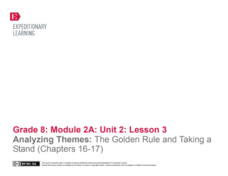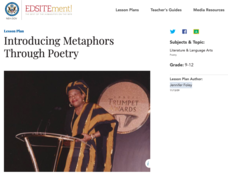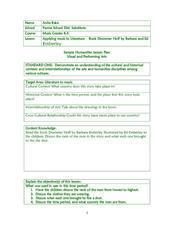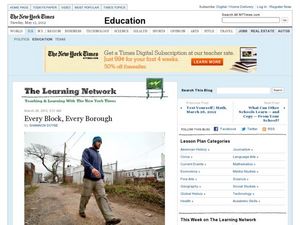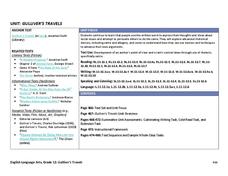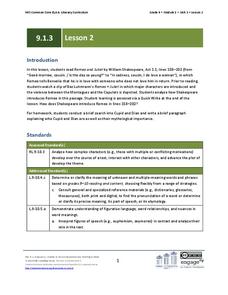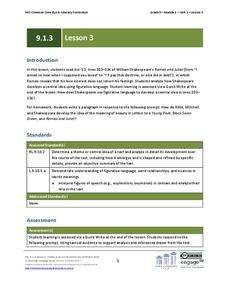EngageNY
Mid-Unit Assessment: Getting to Know a Character: What Details in the Text Help Us Understand Ha?
Take a walk with me. Scholars participate in a gallery walk of the anchor charts their groups created about Inside Out & Back Again in the previous lesson plan. Pupils take notes about Ha's character on sticky notes as they take the...
EngageNY
Analyzing Themes: The Golden Rule and Taking a Stand (Chapters 16-17)
Positive or negative? Class members take another look at one of the taking-a-stand photographs from lesson plan one. They talk with partners to connect the picture to the text in To Kill A Mockingbird and discuss to determine when taking...
National Endowment for the Humanities
Introducing Metaphors Through Poetry
Metaphors are word pictures, creating images in our brains that draw readers to consider how two seemingly unrelated items are alike. Poems by Langston Hughes, Margaret Atwood, and Naomi Shihad Nye provide learners with an opportunity to...
Curated OER
Applying Music to Literature
Kids explore music, history, culture, and literature in a multi-faceted lesson plan. They discuss how both historical and cultural contexts shape music, art, and literature, and then apply these concepts as they engage in a listening...
Curated OER
A Call for Change
"Come gather round people, wherever you roam..." Bring the voice of Bob Dylan to your class with this lesson plan, which takes Dylan's song "The Times They Are A-Changing" and analyzes both the message and voice in the lyrics. Your class...
Curated OER
"Every Block, Every Borough"
From the New York Times Learning Network series, this worksheet poses 10 questions on an article entitled, "Leaving His Footprint on the City" about a man planning to walk every street in all five New York boroughs. The prompts address...
California Department of Education
Possible Careers
Is a STEM career the right choice for me? Lesson four in a six-part career and college readiness series introduces seventh graders to the world of STEM occupations. Individuals use their Holland code results to select, research, and...
California Department of Education
Exploring Military Career Options
A whole world of career options await in the armed forces! Lesson three in a six-part career and college readiness series introduces eighth grade scholars to military careers. Individuals research the entry requirements for the armed...
Meadows Center for Preventing Educational Risk, University of Texas at Austin
Lesson 5 - R-Controlled Syllables
Put on your pirate hat and get ready to teach r-controlled syllables. Learners practice using words that contain ar, or, er, ir, and ur. Instructors model how to decode words to isolate vowel teams, as well as combine r-controlled sounds...
EngageNY
Grade 10 ELA Module 1: Unit 2, Lesson 2
Class members continue their reading of Ethan Canin's "The Palace Thief," focusing on how the relationship between the narrator and Sedgewick changes after the narrator meets Sedgewick's father.
August House
Go to Sleep, Gecko
Use this multidisciplinary lesson to delve into these subjects: English language arts, math, science, drama, and character education. After reading, discussing, and making interpretations about Go To Sleep, Gecko!: A Balinese Folktale by...
August House
Why Koala Has a Stumpy Tail
Learn about the animals of Australia with a language arts lesson about an Australian folktale called, Why Koala Has a Stumpy Tail. After reading the story as a class, kids discuss events and characters from the book, retell the story to...
Louisiana Department of Education
Gulliver’s Travels
Gulliver's Travels tells the story of a man who goes on voyages and encounters strange people. A unit plan introduces readers to the classic text, as well as excerpts from other examples of sarcasm and satire, such as "A Modest Proposal"...
Curated OER
ELD Lesson Plan: Courage
What is true courage? Your class can explore the answer with these three Houghton-Mifflin stories ("Hatchet," "Passage to Freedom," "Climb or Die," and "The True Confessions of Charlotte Doyle"), which feature courageous characters and...
Curated OER
The Magic Apple
A fun and delicious lesson can help your kids learn about plural nouns and story sequencing. After reading The Magic Apple by Rob Cleveland, kids match pictures to story segments and add s to nouns to make them plural. They then cook...
EngageNY
Grade 9 ELA Module 1, Unit 2, Lesson 2
Class members continue their analysis of Letters to a Young Poet, paying particular attention to how Rilke uses metaphor to develop his ideas about the source of inspiration.
EngageNY
Grade 10 ELA Module 1: Unit 2, Lesson 12
As the class concludes its close reading of “The Palace Thief,” groups consider how the narrator's character has changed throughout Ethan Canin’s short story.
EngageNY
Grade 10 ELA Module 1: Unit 2, Lesson 9
Do our childhood circumstances significantly shape us? As the close reading of “The Palace Thief” continues, groups examine how the results of the first "Mr. Julius Caesar" competition influenced the development of the characters in...
EngageNY
Grade 9 ELA Module 1: Unit 3, Lesson 4
Class members watch the clip of Baz Luhrmann’s Romeo + Juliet in which Benvolio persuades Romeo to go with him to the Capulet ball to see Rosaline. Pairs then examine Act 1, scene 3, lines 64–100, and consider how Shakespeare develops...
EngageNY
Grade 9 ELA Module 1: Unit 3, Lesson 2
After viewing a clip from Baz Luhrmann’s Romeo + Juliet in which major characters are introduced, and the violence between the Montagues and the Capulets is depicted, the class reads Act 1, Scene 1, lines 158-202. Groups then analyze the...
EngageNY
Grade 9 ELA Module 1: Unit 3, Lesson 3
Class members listen to a masterful reading of Act 1, Scene 1, lines 203-236 of Romeo and Juliet and then break into groups to examine how Shakespeare uses figurative language to develop Romeo's idealized concept of beauty.
EngageNY
Grade 9 ELA Module 1: Unit 3, Lesson 13
Readers examine the conversation between Friar Laurence and Romeo in Act 3, scene 3 of Romeo and Juliet and consider how Shakespeare's word choices impact the development of Romeo's character.
EngageNY
Grade 9 ELA Module 1: Unit 3, Lesson 18
Why is Romeo and Juliet considered a tragedy? Class members conclude their reading of the play, focusing on the final lines of Act 5, scene 3. They also consider how Shakespeare structures the text, orders events, and manipulates time to...
EngageNY
Grade 9 ELA Module 1: Unit 3, Lesson 19
To prepare for the unit's final assessment essay, class members collaborate to find evidence that reveals Romeo and Juliet as tragic heroes.



